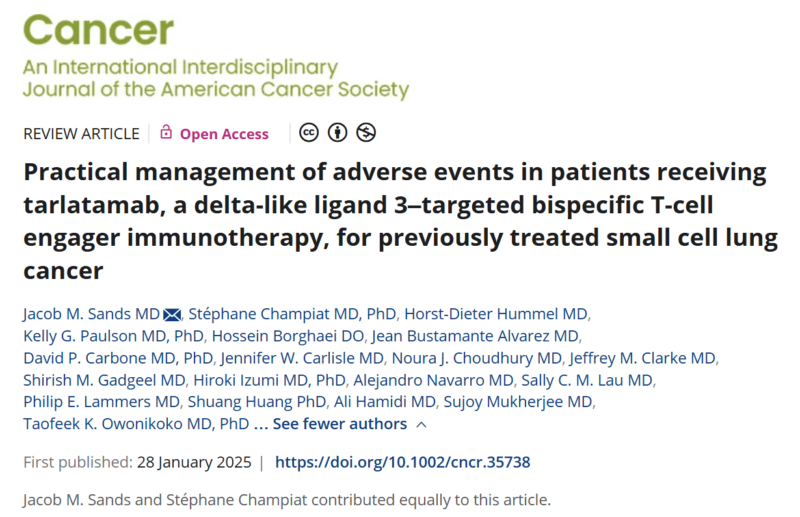
Management of adverse events in patients receiving Tarlatamab for previously treated SCLC by Jacob Sands et al.
On 28 January a paper by Jacob Sands, Medical Oncologist at Dana-Farber Cancer Institute, and colleagues was published in Cancer Journal, titled:
Authors: Jacob Sands, Stéphane Champiat, Horst-Dieter Hummel, Sujoy Mukherjee, Taofeek Owonikoko et al.

Tarlatamab is a bispecific T-cell engager immunotherapy that targets delta-like ligand 3 (DLL3) and the CD3 molecule. In the phase 2 DeLLphi-301 trial, which focused on patients with previously treated small cell lung cancer (SCLC), tarlatamab was administered at a dose of 10 mg every two weeks.
The updated safety analysis from the DeLLphi-301 trial revealed that the most frequent treatment-emergent adverse events (TEAEs) included:
- Cytokine release syndrome (CRS) at 53%
- Pyrexia at 38%
- Decreased appetite at 36%
- Dysgeusia at 32%
- Anemia at 30%
CRS was predominantly mild, classified as grade 1 or 2, and typically occurred after the first or second dose of tarlatamab. Management strategies for CRS included supportive care measures such as administering antipyretics like acetaminophen, intravenous hydration, and glucocorticoids. Other notable TEAEs included neutropenia (16%) and immune effector cell-associated neurotoxicity syndrome (ICANS) affecting 10% of patients.
Read more posts relating to Immune Oncology on oncodaily.com.
-
Challenging the Status Quo in Colorectal Cancer 2024
December 6-8, 2024
-
ESMO 2024 Congress
September 13-17, 2024
-
ASCO Annual Meeting
May 30 - June 4, 2024
-
Yvonne Award 2024
May 31, 2024
-
OncoThon 2024, Online
Feb. 15, 2024
-
Global Summit on War & Cancer 2023, Online
Dec. 14-16, 2023
